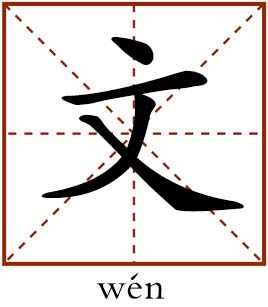Literature

This character represents a general concept of literature. It is often associated with talent, knowledge or culture. Educated people or literati are usually called wen ren.
文以载道
wén yǐ zài dào
Wen refers to writings and dao is the Tao, or the “way,” which is often interpreted as a moral or truth in this proverb. The proverb literally means that morals or truth should be expressed in words.
It is an important principle of writing in China, first proposed by Xunzi (313–238 BCE), a Confucian philosopher who lived during the Warring States Period. Xunzi interpreted Tao as the natural order of the universe and a Sage of Confucianism as an executor of Tao. Therefore, he argued that words and writings should be a mirror of Tao. This idea was promoted by the Classical Prose Movement during the Tang Dynasty. Han Yu (768–824), one of the leaders of this movement, advocated that literature and ethics should be intertwined. Here, Tao was further explained as an ethical concept, which should be an important element in literature.
Today, the moral significance of literature is still influential in China. The Chinese tend to value writings that provide enlightenment or have the function of cultivation.
文如其人
wén rú qí rén
This proverb means that the writing style mirrors the writer. Different writings are the primary way for readers to get to know their authors. The Chinese, particularly, believe that they can have at least a glance of one’s personality and experience through writing.
For instance, one of the greatest poets in China, Li Bai (701–762), gave later generations an opportunity to understand him through his poems, which are marked by amazing imagination, masculine grandeur and natural grace, with lines that read as smooth as running water. Li’s poetry on the whole is calm, at times sunny in outlook. Even in describing sorrow, he is little given to expression of despair or bitterness. In the autumn of Li’s life, he couldn’t fulfill his desire to serve his country but wandered lonely like a drifting cloud instead. Through reading Li’s poetry, people generally consider him a romantic poet tirelessly searching for spiritual freedom and communion with nature.
edited by REN GUANHONG
